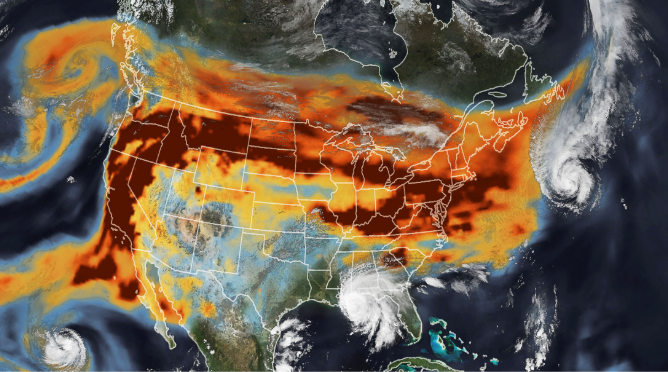100% clean energy
Trump’s Climate Rollback Concerns Arizona Advocates

A coalition of progressive organizations in Arizona expressed serious concerns regarding President-elect Donald Trump’s intentions to diminish climate change initiatives. During a press conference on Thursday, activists highlighted the potential repercussions of rolling back parts of the Inflation Reduction Act (IRA), which allocates significant funding for clean energy and climate-related policies.
The IRA features $370 billion dedicated to fostering clean energy and aiming to lower energy costs for consumers. Under the Biden administration, ambitious climate objectives were set, including a goal of achieving 100% carbon pollution-free energy by 2035. Although President Biden implemented measures to protect $74 billion in approved funding, Trump could still revoke around $20 billion related to these initiatives.
Dora Vasquez, the executive director of the Arizona Alliance of Retired Americans, warned, “The data is clear: Rolling back climate policies would be a bad deal for Arizonans.” She cited rising heat-related fatalities and numerous consecutive 100-degree days as direct health impacts of climate change affecting the state.
Vasquez emphasized the necessity of maintaining tax incentives for homeowners to install energy-efficient cooling systems, stating, “While these programs are already helping many across Arizona, the future of these programs is uncertain. Let’s ensure that these benefits remain in place for years to come.”
The group also referred to alarming climate trends, noting that last year marked the hottest July in 175 years, and the summer of 2023 was the hottest since 1880. These temperature extremes, alongside evidence of human-driven climate change, signify a critical juncture for environmental stability.
Ojas Sanghi, co-lead of the Arizona Youth Climate Coalition, raised concerns about the uncertainty of the future, particularly regarding water availability. “As a young person, I can’t really know if I’m going to have a future in this state because I don’t know if we will have water,” he stated, illustrating the anxiety many young people face regarding climate inaction and its mental health consequences.
Despite these worries, Sanghi acknowledged potential hope through the IRA’s emissions reduction incentives and green job creation. “That sort of a better future, the Inflation Reduction Act is the key to that future,” he asserted.
Advocates believe continuing investments under the IRA can lead to improved health outcomes for Arizona families. The impact transcends individual benefits, extending to businesses that also harness IRA incentives. Will Humble, Executive Director of the Arizona Public Health Association, noted, “If they roll back some of these provisions, they are going to undermine decisions businesses are making in their communities.”
Climate change initiatives often encounter opposition over costs, but the advocates argue that the cost of inaction poses severe economic risks. Vasquez posited that consumers will eventually appreciate the benefits of climate investments once they witness their impacts. “A lot of the benefits of the Inflation Reduction Act will be seen down the road,” Sandy Bahr, director of the Grand Canyon Chapter of the Sierra Club, explained.
While Trump indicated he might retain certain provisions of the IRA, he plans to repeal others. Humble urged perseverance in the face of adversity regarding climate-related policies. “If we give up now and don’t go on defense they are going to run all over us,” he warned.


















